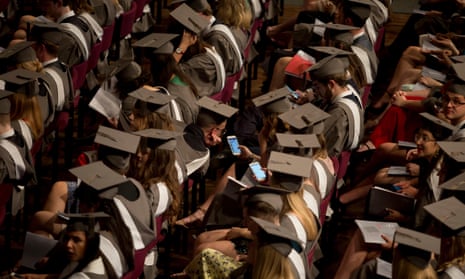UK universities would be hugely damaged by a sustained diplomatic rift between Britain and China, according to a report that predicts difficulty in replacing the Chinese students who now take up more than one in four international PhD places.
The study, co-authored by the former universities minister Jo Johnson, found that many leading institutions remain highly dependent on Chinese students for tuition fee income as well as to fill postgraduate research courses in subjects such as economics, science and technology.
A sudden inflaming of tensions between the UK and China – recently a parliamentary researcher was arrested for allegedly spying for China – could see the pipeline shut off, leaving UK universities with few viable alternatives after the collapse in EU student numbers coming to the UK since Brexit.
Johnson, a visiting professor at King’s College London’s policy institute, said: “The sector continues to follow a ‘cross your fingers’ strategy that decoupling is in the future never necessary for China, in the same ways it was for relations with Russia in February 2022. The China question therefore to a great degree remains unanswered.
“The government must urgently help universities with a framework for how to maximise the benefits from research collaboration and student and academic mobility while managing the downsides, including the risks to national security from bad-faith actors and the dangers of over-reliance on a single country.”
The KCL report says the single most effective way for the government to reduce the reliance on Chinese students would be to raise tuition fees for UK undergraduates in line with inflation for the first time since 2016, when fees were set at £9,250 a year.
“Teaching UK students at this level will be loss-making for many higher education institutions, leaving them with few options other than to recruit international students whose fees are unregulated,” the report concludes.
In 2021-22, more than 3,100 Chinese nationals enrolled in the first year of a doctoral programme at UK universities, far above the 2,000 combined from the three next largest countries – the US, India and Saudi Arabia.
“With large emerging countries such as India unlikely to be plausible substitutes for the foreseeable future, finding alternatives to China that reduce its importance in the UK knowledge economy remains no simple undertaking,” the report says.
In the space of five years, the proportion of international PhD places held by Chinese nationals has risen from 17% to 28% while the number of EU doctoral students has fallen by 42%. International students take up just under half of the total PhD places at UK universities.
The KCL report also notes that Chinese doctoral students are concentrated in leading research centres: the most recent figures show 80% were studying at universities belonging to the Russell Group.
Nine Russell Group universities had more than 5,000 undergraduate and postgraduate students from China in 2021-22, and University College London alone has more than 10,000 Chinese students in its student body of 44,000.
Last week it was revealed that a parliamentary researcher had been arrested under the Official Secrets Act, leading Rishi Sunak to confront the Chinese premier, Li Qiang, at Sunday’s G20 summit over China’s “unacceptable” interference. The researcher has said he is “completely innocent”.
A report by a House of Lords committee castigates the Office for Students (OfS), the higher education regulator for England, for failing to prepare the sector for the financial instability that the withdrawal of Chinese students would cause.
The report by the industry and regulators committee says there is a “worrying complacency” over the dependency on international student fees, which it says fails to take account of the “risks of geopolitical shifts”, especially involving students from China.
The committee held a series of hearings during its investigation into the OfS’s operations and its final report is highly critical, arguing that the OfS “lacks independence from the government and its actions often appear driven by the ebb and flow of short-term political priorities and media headlines.”
Clive Hollick, the committee’s chair, said: “At a time when the higher education sector faces a looming crisis caused by financial instability, increased costs, industrial action and reduced EU research funding, it is vital that the sector’s regulator is fit for purpose.
“However, it was evident throughout our inquiry that the OfS is failing to deliver and does not command the trust or respect of either providers or students, the very people whose interests it is supposed to defend. We were surprised by the regulator’s view that the sector’s finances are in good shape, which is not an assessment that we or most of our witnesses share.”
James Wharton, the OfS’s chair, said in response that his organisation was “alive to significant risks, including the impact of a fixed undergraduate tuition fee, cost pressures and an over-reliance by some on international students. Our important work in this area is often not publicly visible.”
